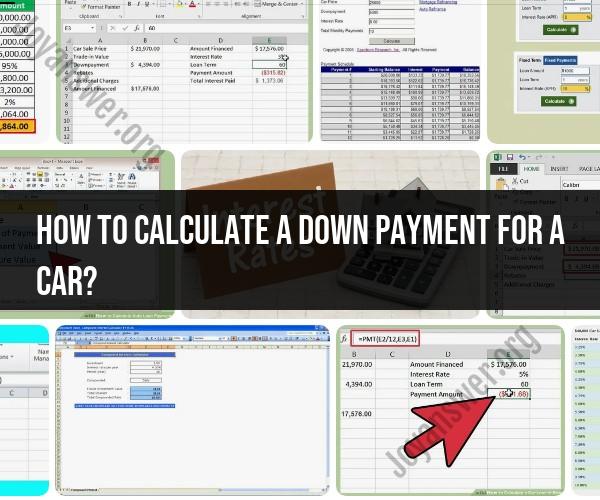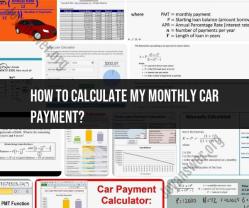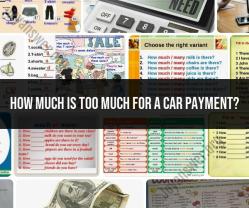How to calculate a down payment for a car?
Calculating a down payment for a car involves considering your budget, the total cost of the car, and the percentage you want to put down. Here's a step-by-step guide on how to calculate a down payment for a car:
Determine Your Budget:
- Before you decide on a down payment, establish a clear budget for the entire car purchase. Your budget should consider your monthly income, expenses, and savings goals. Ensure that you can comfortably afford the car without stretching your finances too thin.
Research Car Prices:
- Research the make and model of the car you want to purchase. Visit dealerships, check online listings, and compare prices. Be sure to account for taxes, registration, and other fees associated with buying a car.
Decide on a Down Payment Percentage:
- A typical down payment for a car is around 20% of the car's total price. However, you can choose a lower or higher percentage based on your financial situation. A larger down payment reduces your monthly loan payments and the overall cost of the loan.
Calculate the Down Payment:
- To calculate the down payment, multiply the total cost of the car by the percentage you want to put down. For example, if the car costs $20,000, and you want to put down 20%, the calculation is:Down Payment = $20,000 x 0.20 = $4,000.
Consider Trade-In Value:
- If you plan to trade in your current vehicle, the trade-in value can be used as part of your down payment. The dealership will assess the value of your trade-in and deduct it from the down payment you need to make.
Account for Taxes and Fees:
- Remember to factor in any sales tax, registration fees, and other costs associated with the purchase. These will increase the total amount you need to pay upfront.
Review Financing Options:
- Evaluate your financing options, including auto loans from banks, credit unions, or the dealership. Your down payment and credit history will affect the interest rate you're offered.
Save for the Down Payment:
- If you haven't saved the full down payment amount yet, create a savings plan to reach your target. Open a dedicated savings account and set up automatic transfers to ensure you reach your goal.
Consider Your Trade-Offs:
- Be mindful of how your down payment affects the loan term and monthly payments. A larger down payment means smaller monthly payments but may require more upfront cash. A smaller down payment means larger monthly payments but less immediate cash required.
Shop for the Best Deal:
- Before finalizing your purchase, shop around for the best financing terms and consider preapproval for an auto loan. Different lenders may offer varying interest rates and loan terms.
Remember that the down payment is just one aspect of car ownership. You'll also need to consider ongoing costs like insurance, maintenance, and fuel. Careful financial planning will help ensure that buying a car fits comfortably into your budget.
Car Down Payment Calculation: A Step-by-Step Guide
To calculate your car down payment, you will need to know the following:
- The purchase price of the car
- The down payment percentage you want to make
Once you have this information, you can use the following formula to calculate your down payment:
Down payment = Purchase price of car x Down payment percentage
For example, if the purchase price of the car is $25,000 and you want to make a 20% down payment, your down payment would be $5,000.
Here is a step-by-step guide on how to calculate your car down payment:
- Determine the purchase price of the car. This is the price of the car, plus any taxes and fees.
- Decide on a down payment percentage. A 20% down payment is generally considered to be ideal, but you may be able to make a smaller down payment if you qualify for a good interest rate.
- Use the formula above to calculate your down payment.
Financing Your Vehicle: How to Determine the Down Payment
The amount of your down payment can have a significant impact on your monthly car payments and the total interest you will pay over the life of the loan. A larger down payment will lower your monthly payments and the total interest you will pay.
However, it is important to remember that you should not make a down payment that is too large, as this could leave you strapped for cash in case of an emergency. It is also important to factor in the cost of insurance and registration when determining how much you can afford to spend on a down payment.
The Art of Budgeting: Calculating Your Car's Down Payment
Once you have calculated your car down payment, you will need to create a budget to save the money. This may require you to make some lifestyle changes, such as cutting back on unnecessary expenses or getting a part-time job.
It is important to be realistic about how much money you can save each month. If you set unrealistic goals, you are more likely to get discouraged and give up.
Here are some tips for saving for your car down payment:
- Set a goal for how much money you want to save each month.
- Create a budget and track your spending.
- Cut back on unnecessary expenses.
- Get a part-time job.
- Ask family and friends for help.
By following these tips, you can save the money you need for your car down payment and reach your goal of buying a new car.












